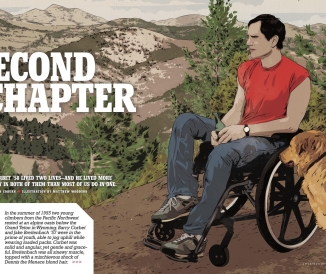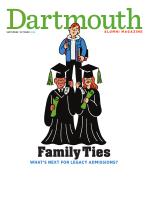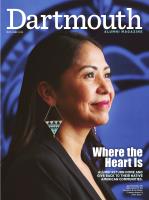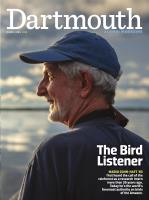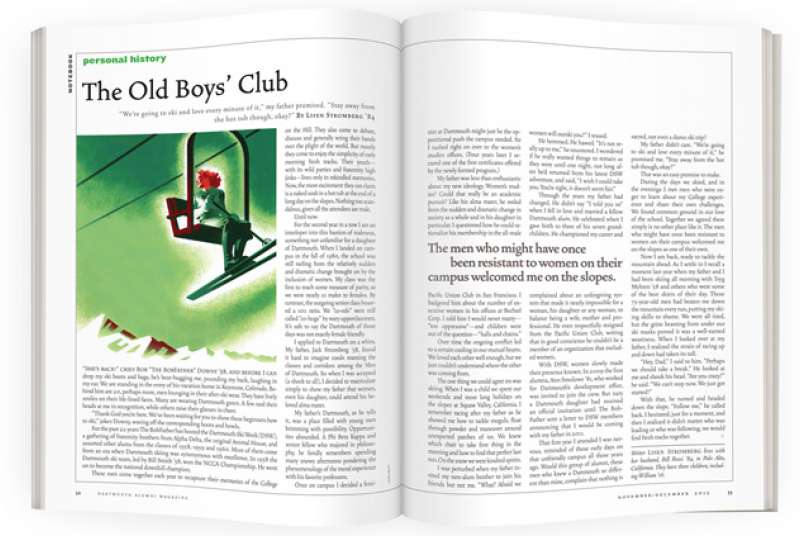
The Old Boys’ Club
“She’s back!” cries Bob “The BobFather” Downey ’58, and before I can drop my ski boots and bags, he’s bear-hugging me, pounding my back, laughing in my ear. We are standing in the entry of his vacation home in Keystone, Colorado. Behind him are 20, perhaps more, men lounging in their after-ski wear. They have lively smiles on their life-lined faces. Many are wearing Dartmouth green. A few nod their heads at me in recognition, while others raise their glasses in cheer.
“Thank God you’re here. We’ve been waiting for you to show these beginners how to ski,” jokes Downey, waving off the corresponding hoots and howls.
For the past 22 years The BobFather has hosted the Dartmouth Ski Week (DSW), a gathering of fraternity brothers from Alpha Delta, the original Animal House, and assorted other alums from the classes of 1958, 1959 and 1960. Most of them come from an era when Dartmouth skiing was synonymous with excellence. In 1958 the Dartmouth ski team, led by Bill Smith ’58, won the NCCA Championship. He went on to become the national downhill champion.
These men come together each year to recapture their memories of the College on the Hill. They also come to debate, discuss and generally wring their hands over the plight of the world. But mostly they come to enjoy the simplicity of early morning fresh tracks. Their youth—with its wild parties and fraternity high jinks—lives only in rekindled memories. Now, the most excitement they can claim is a naked soak in a hot tub at the end of a long day on the slopes. Nothing too scandalous, given all the attendees are male.
Until now.
For the second year in a row I am an interloper into this bastion of maleness, something not unfamiliar for a daughter of Dartmouth. When I landed on campus in the fall of 1980, the school was still reeling from the relatively sudden and dramatic change brought on by the inclusion of women. My class was the first to reach some measure of parity, as we were nearly 1:1 males to females. By contrast, the outgoing senior class boasted a 10:1 ratio. We “co-eds” were still called “co-hogs” by wary upperclassmen. It’s safe to say the Dartmouth of those days was not exactly female friendly.
I applied to Dartmouth on a whim. My father, Jack Stromberg ’58, found it hard to imagine coeds roaming the classes and corridors among the Men of Dartmouth. So when I was accepted (a shock to all), I decided to matriculate simply to show my father that women, even his daughter, could attend his beloved alma mater.
My father’s Dartmouth, as he tells it, was a place filled with young men brimming with possibility. Opportunities abounded. A Phi Beta Kappa and senior fellow who majored in philosophy, he fondly remembers spending many snowy afternoons pondering the phenomenology of the moral experience with his favorite professors.
Once on campus I decided a feminist at Dartmouth might just be the oppositional push the campus needed. So I rushed right on over to the women’s studies offices. (Four years later I secured one of the first certificates offered by the newly formed program.)
My father was less than enthusiastic about my new ideology. Women’s studies? Could that really be an academic pursuit? Like his alma mater, he reeled from the sudden and dramatic change in society as a whole and in his daughter in particular. I questioned how he could rationalize his membership in the all-male Pacific Union Club in San Francisco. I badgered him about the number of executive women in his offices at Bechtel Corp. I told him I would never marry—“too oppressive”—and children were out of the question—“balls and chains.”
Over time the ongoing conflict led to a certain cooling in our mutual hearts. We loved each other well enough, but we just couldn’t understand where the other was coming from.
The one thing we could agree on was skiing. When I was a child we spent our weekends and most long holidays on the slopes at Squaw Valley, California. I remember racing after my father as he showed me how to tackle moguls, float through powder and maneuver around unexpected patches of ice. We knew which chair to take first thing in the morning and how to find that perfect last run. On the snow we were kindred spirits.
I was perturbed when my father invited my non-alum brother to join his friends but not me. “What? Afraid we women will outski you?” I teased.
He hemmed. He hawed. “It’s not really up to me,” he countered. I wondered if he really wanted things to remain as they were until one night, not long after he’d returned from his latest DSW adventure, and said, “I wish I could take you. You’re right, it doesn’t seem fair.”
Through the years my father had changed. He didn’t say “I told you so” when I fell in love and married a fellow Dartmouth alum. He celebrated when I gave birth to three of his seven grandchildren. He championed my career and complained about an unforgiving system that made it nearly impossible for a woman, his daughter or any woman, to balance being a wife, mother and professional. He even respectfully resigned from the Pacific Union Club, writing that in good conscience he couldn’t be a member of an organization that excluded women.
With DSW, women slowly made their presence known. In 2009 the first alumna, Ann Smolowe ’81, who worked for Dartmouth’s development office, was invited to join the crew. But nary a Dartmouth daughter had received an official invitation until The Bob-Father sent a letter to DSW members announcing that I would be coming with my father in 2011.
That first year I attended I was nervous, reminded of those early days on that unfriendly campus all those years ago. Would this group of alumni, these men who knew a Dartmouth so different than mine, complain that nothing is sacred, not even a damn ski trip?
My father didn’t care. “We’re going to ski and love every minute of it,” he promised me. “Stay away from the hot tub though, okay?”
That was an easy promise to make.
During the days we skied, and in the evenings I met men who were eager to learn about my College experience and share their own challenges. We found common ground in our love of the school. Together we agreed there simply is no other place like it. The men who might have once been resistant to women on their campus welcomed me on the slopes as one of their own.
Now I am back, ready to tackle the mountain ahead. As I settle in I recall a moment last year when my father and I had been skiing all morning with Tryg Myhren ’58 and others who were some of the best skiers of their day. Those 75-year-old men had beaten me down the mountain every run, putting my skiing skills to shame. We were all tired, but the grins beaming from under our ski masks proved it was a well-earned weariness. When I looked over at my father, I realized the strain of racing up and down had taken its toll.
“Hey, Dad,” I said to him. “Perhaps we should take a break.” He looked at me and shook his head. “Are you crazy?” he said. “We can’t stop now. We just got started!”
With that, he turned and headed down the slope. “Follow me,” he called back. I hesitated, just for a moment, and then I realized it didn’t matter who was leading or who was following, we would find fresh tracks together.
Writer Lisen Stromberg lives with her husband, Bill Rossi ’84, in Palo Alto, California. They have three children, including William ’16.



